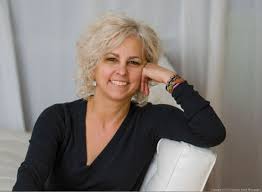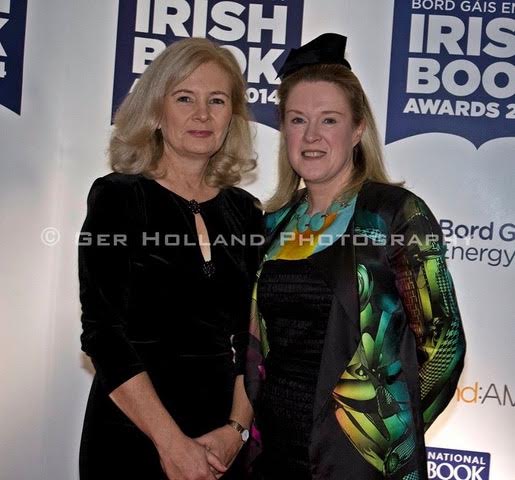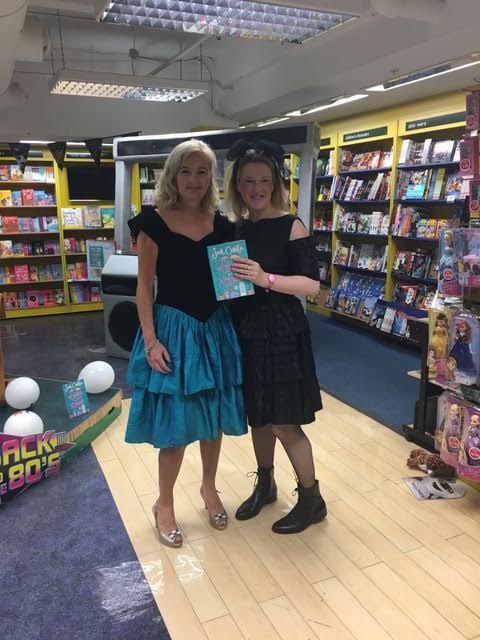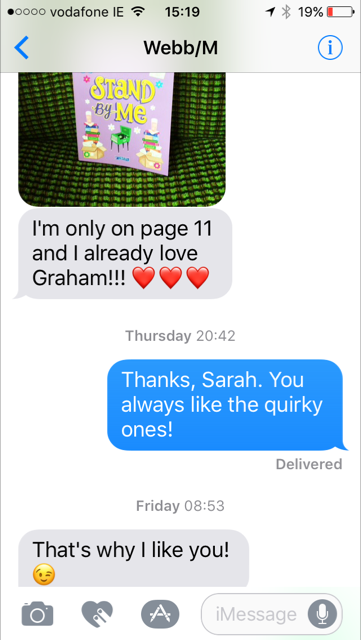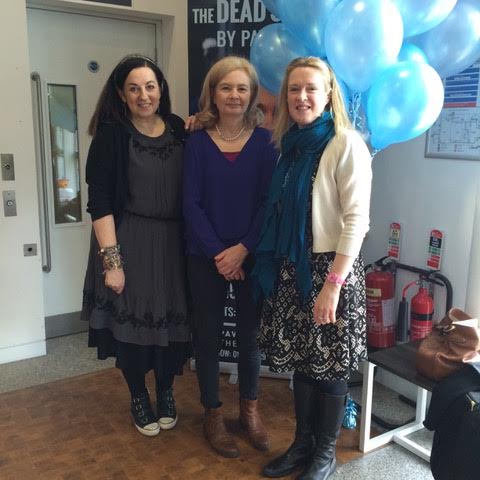Last weekend I attended the CBI (Children’s Books Ireland) conference in the Lighthouse cinema in Smithfield, Dublin.
The conference is always well attended by writers, illustrators, teachers, librarians, booksellers, publishers and children’s book lovers and one of the great pleasures of the weekend is talking to fellow book fans.
Lucy Cousins in Conversation with Mags Walsh
Lucy Cousins and a Young Friend
Lucy spoke about her love of art from a very early age and showed us some of her childhood drawings. She said ‘Don’t think about (your ideas and art) too much, be spontaneous. I’ve never felt I have to stick to any rules.’
She also feels strongly that Maisy is just Maisy, not a boy and not a girl and spoke about gender in children’s books and how we should just let children be children. Hear, hear!
She likes painting animals as ‘People seem limited in their scope to me. I like to use bold, bright colours.’
It took her 5 years at art college to find her style and to be confident with colour. A project designing cups and plates for a children’s party led to her discovering that she should use the colours she liked.
Lucy has a set routine. ‘If I didn’t have a routine I wouldn’t work, I’d potter around all day,’ she said. She works on her creative projects in the morning and does her admin in the afternoons.
Rod Biddulph's Work
It took both Rob Biddulph and Chris Judge over five years to get their first books published. Rob said ‘People think writing for children is easy, but it’s not.’
Rob likes picturebooks as he gets control over his work. He likes rhyme as it’s ‘mathematical’ and follows a pattern. It helps children join in, he explains.
It takes Chris between 1 day and 2/3 weeks to do a picturebook spread. He has been known to complete a book in 3 weeks.
Anna Carey and Lucy Adlington spoke about writing historical novels.
‘Research is endlessly seductive but writing’s hard work,’ Lucy said.
The details ground your story but you don’t have to put all your research in, she explained. Her new book, The Red Ribbon sounds fascinating, a World War II book about clothes and the Jewish seamstresses who created them.
Anna spoke about her Irish suffragette books set in the early 20th century, which she wrote because she wanted to read about teen suffragettes herself. She tries to make history interesting for modern readers by using a light hand with her research and plenty of humour. Her book, The Making of Mollie is well worth seeking out.
John Boyne, Cecelia Ahern and Shane Hegarty talked about writing for different age groups.
‘I don’t write books for adults or children,’ John said. ‘I write books about adults or children.’
He also said ‘I’m always open to story.’ And he finds the balance between writing children’s books and books for adults works well for him.
Kate DiCamillo
Kate DiCamillo gave a stirring talk about the wonders of the world. She spoke about a childhood trip on an glass bottomed boat and the secret world under her feet, of fish and turtles. A woman on the boat took her arm and said ‘Oh my, this world!’ and it’s always stayed with her, she explained.
She’s a big fan of Charlotte’s Web by EB White, a book that can bring people together.
Kate writes 6/7/8 drafts before sending her work to her editor. Then she gets a 10 editorial letter back. She spends the day sulking: ‘If you know so much why don’t you write a book?’ and then she gets to work.
Kate DiCamillo's Writing Advice
She gave the following advice:
Read as much as you can
Find a way to make a deal with yourself – work out how you are going to do the writing you need to do
There is a mistaken notion that writing should be easy or it should come out right the first time
If you do anything in the arts you need to be prepared to pay attention all the time, keep your eyes and ears open, your mind and your heart
Do not give up – the race goes to the idiot who will not give up.
Joseph Coehlo
Poet and picturebook writer, Joseph Coelho attended a comic writing workshop at ITV when he was a child and was told he was a really good writer – this was the 1st time someone had seen him as a writer.
He is passionate about libraries and how they can change children’s lives. They certainly changed my life, he said.
The New Voices panel featured nine different new children’s writers who read their work with gusto.
Debi Gliori says she ‘creates words and pictures that help make sense of the world for our smallest people.’
She shared her journey with the audience – a journey from darkness into light – and talked about how books can help children make sense of the world and be seen.
‘Books are not a link in the chain of life,’ she said. ‘They are the clasp.’
James Mayhew gave a fascinating talk about flying carpets, the Arabian Nights and other traditional tales and finally Sally Gardner talked about living with dyslexia and how she wants to help dyslexic children navigate the world. She said ‘We accept diversity in gender but we do not accept diversity of the brain.’
It was a most stimulating and though-provoking weekend and thanks to all at CBI for their hard work in putting the conference together.




